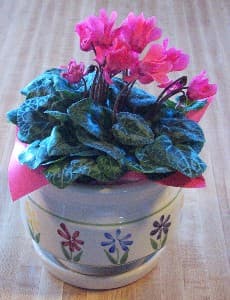How to Grow Cyclamen Plants

About Growing Cyclamen
The Cyclamen houseplant is a popular, easy-to-grow plant, that is grown both indoors and out. Cyclamen are members of the Primrose family. They are native to Europe, Northern Africa, and Western Asia. There are 20 species of cyclamen plants, most of which are hardy. The plant has attractive, dark green, heart-shaped leaves. Flowers bloom profusely in a wide range of colors. Cyclamen plant care is easy. They grow well in semi-shaded areas, making them good houseplants. Most varieties grow about 4-6 inches, a perfect size for indoor pots and containers.
Their heart-shaped leaves make Cyclamen houseplants a popular gift for Valentine’s Day. Give them as anniversary gifts, too.
When grown as outdoor plants, we recommend they are placed in shade gardens, or areas around trees and rock gardens, similar to their native habitat.
Cyclamen Houseplant Specifications
Flower Colors: Single or double-flowered blooms in shades of pink, red, violet, and white.
Flowers Bloom: Winter
Plant Height: 6 – 9 inches tall.
Light Requirements: Indirect light, partial shade.
Toxicity: Toxic to humans and pets.
Plant Hardiness Zone: 9 – 11
Ideal Soil pH: 6.0 – 7.0
Native To: Europe, Northern Africa, and Western Asia.
Plant Type: Perennial
Botanical name: Cyclamen
Other Names: Stag Truffle, Sowbread, Spring Sowbread
Are Cyclamen Plants Edible?
NO!!
Cyclamen houseplants are poisonous plants. The bulbs and rhizomes are toxic. Keep plants away from children and pets.
Medicinal Uses of Cyclamen Plants
It is important to note that parts of the plant are toxic. Do not make homemade remedies unless you know what parts of the plant to use.
The rootstock of the plant has medicinal uses. Cyclamen is used for:
- Eye diseases
- Gout
- Relief of menstrual pains
- Snakebites
- Tinnitus
- A nasal spray to clear mucus and unblock sinuses.
- It is also used as a laxative.
Plant Light Requirement
These plants do not require a lot of sunlight.
For outdoor plants:
During the growing period, give the plant bright, indirect light, or partial shade. While the plant is dormant, place it in a shady area.
For indoor plants:
Place the plants near, but not in, a sunny window where it will receive bright, indirect sunlight or partial shade.
Cyclamen Plant Care - Propagation
Cyclamen is most often propagated from its tubers (roots). Dig up the tubers and divide them into sections. Each section must have at least one eye. Replant divided tubers, planting just below the soil level.
Cyclamen seeds can also be harvested from spent flower blooms. Horticulturalists use this method to cultivate new varieties. Growing from seed takes more time than separating tubers. Few seed companies carry the seeds.
Cyclamen Plant Care and Maintenance
Cyclamen plants grow well in a variety of soils and a wide pH level. They do their best in a rich, well drained soil, with a slightly acidic soil pH. Before planting, mix in compost and organic matter in the planting area.
Plant cyclamen tubers just below the soil level, no more than 1 to 2 inches deep.
Water plants well, and allow the soil to dry a little between watering. Use bottom watering for indoor plants. Do not allow the soil to remain wet and soggy, as root rot can occur.
Mist leaves during periods of low humidity.
For optimum plant growth, add fertilizer monthly during the growing season. For indoor plants, use fertilizer spikes or liquid fertilizer.
Different varieties of cyclamen plants will bloom at varying times and frequency.
To promote blooms:
First, add a fertilizer high in phosphorus, and increase the light level.
Second, provide cool nighttime temperature, 60 to 65 degrees.
Pruning Cyclamen Plants
Remove any yellowed, dead, damaged, or diseased leaves and stems.
Remove spent blooms when they die back for a neat and tidy appearance.
Insects and Plant Disease
Cyclamen plants have problems with mites. It is difficult to control, and most people discard the plant.
Root rot is the most common. But, it can be avoided by keeping the soil well-drained. Houseplant pots need to have a hole in the bottom for good drainage.
Plant Hardiness
Most varieties of cyclamen are hardy. However, there are a few varieties that will not survive a frost. If you are not certain as to the hardiness of the variety you have, then cover the plants, or bring them indoors when cold weather arrives.
Related Articles
Additionally, people who read this article on Cyclamen houseplants will like:
How to Grow Houseplants – Indoor plant care
Please support our site. Shop for:
- rmmatthews100@hotmail.com
- 585-721-6528
- Rochester, NY
©1999-2024 GardenersNet.Com, All Rights Reserved

